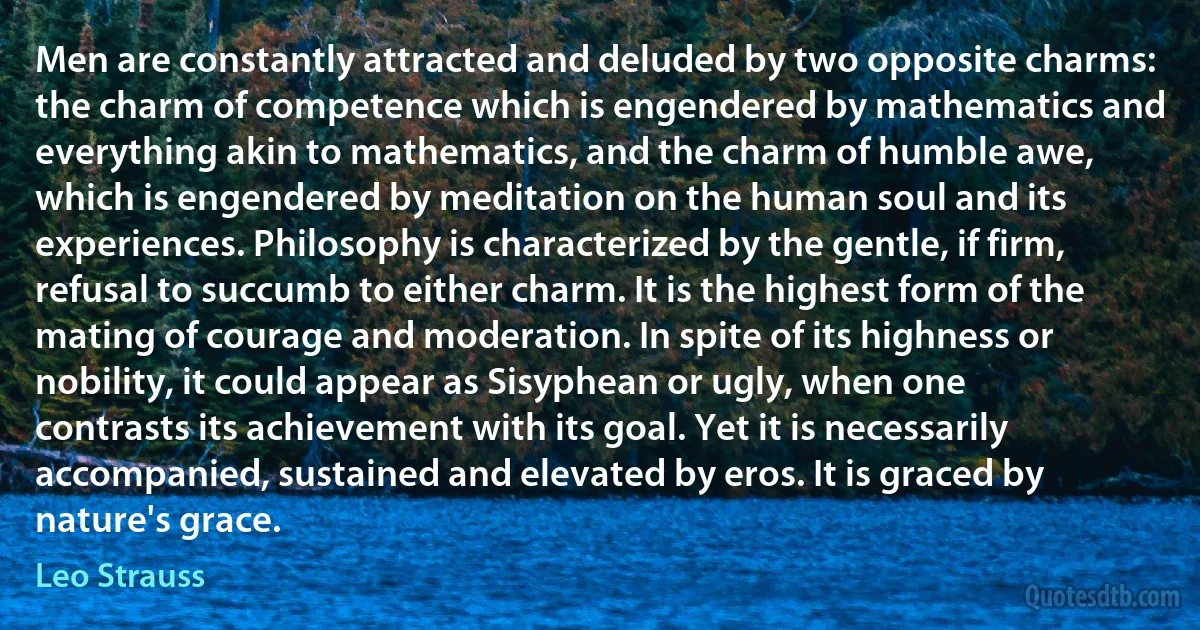
Men are constantly attracted and deluded by two opposite charms: the charm of competence which is engendered by mathematics and everything akin to mathematics, and the charm of humble awe, which is engendered by meditation on the human soul and its experiences. Philosophy is characterized by the gentle, if firm, refusal to succumb to either charm. It is the highest form of the mating of courage and moderation. In spite of its highness or nobility, it could appear as Sisyphean or ugly, when one contrasts its achievement with its goal. Yet it is necessarily accompanied, sustained and elevated by eros. It is graced by nature's grace.
Leo StraussRelated topics
appear courage eros everything form gentle grace highness human humble men mathematics nobility soul ugly yetRelated quotes
Some students of philosophy have unreasonably high expectations of the subject. They expect it to provide them with a complete and detailed picture of the human predicament. They think that philosophy will reveal to them the meaning of life, and explain to them every facet of our complex existences. Now, although studying philosophy can illuminate fundamental questions about our lives, it does not provide anything like a complete picture, if indeed there could be such a thing. Studying philosophy isn't an alternative to studying art, literature, history, psychology, anthropology, sociology, politics, and science.

Nigel Warburton
Chess is a form of intellectual productiveness, therein lies, its peculiar charm. Intellectual productiveness is one of the greatest joys -if not the greatest one- of human existence. It is not everyone who can write a play, or build a bridge, or even make a good joke. But in chess everyone can, everyone must, be intellectually productive and so can share in this select delight. I have always a slight feeling of pity for the man who has no knowledge of chess, just as I would pity for the man who has no knowledge of love. Chess, like love, like music, has the power to make men happy.

Siegbert Tarrasch
This is the kingdom of the chemical elements, the substances from which everything tangible is made. It is not an extensive country, for it consists of only a hundred or so regions (as we shall often term the elements), yet it accounts for everything material in our actual world. From the hundred elements that are at the center of our story, all planets, rocks, vegetation, and animals are made. These elements are the basis of the air, the oceans, and the Earth itself. We stand on the elements, we eat the elements, we are the elements. Because our brains are made up of elements, even our opinions are, in a sense, properties of the elements and hence inhabitants of the kingdom.

Peter Atkins
Some people think that evolutionary psychology claims to have discovered that human nature is selfish and wicked. But they are flattering the researchers and anyone who would claim to have discovered the opposite. No one needs a scientist to measure whether humans are prone to knavery. The question has been answered in the history books, the newspapers, the ethnographic record, and the letters to Ann Landers. But people treat it like an open question, as if someday science might discover that it's all a bad dream and we will wake up to find that it is human nature to love one another.

Steven Pinker
There is beauty as well as danger when you deal with the subtle realms. The beauty is that you can have realizations, revelations, and experiences that can carry over into the waking state. The danger is that you can expose yourself to negative influences. There are many positive as well as negative entities that infiltrate one's consciousness while dreaming or disturb one during astral travel. Often they appear in the form of family members or close friends. There are also beings on the subtle plane that are in the habit of engaging the sleeping person in unwanted sexual activity.

Bhakti Tirtha Swami
